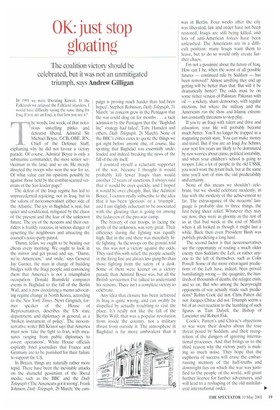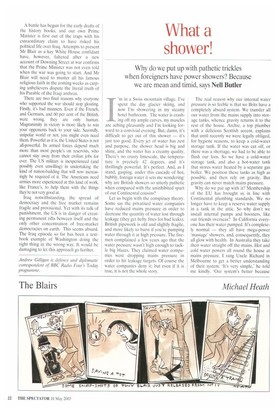OK: just stop gloating
The coalition victory should be celebrated, but it was not an unmitigated triumph, says Andrew Gilligan In 1991 we were Liberating Kuwait. In the Falklands we relieved the Falkland islanders. I would have difficulty saying the same thing for Iraq. If you are an Iraqi, is that how you see it?
The words, last week, of that notorious snivelling pinko and defeatist liberal, Admiral Sir Michael Boyce, GCB, OBE, RN,
Chief of the Defence Staff, explaining why he did not favour a victory parade. Of course, Admiral Boyce is only a submarine commander, the most senior serviceman in the land, and so on. He merely directed the troops who won the war for us. Of what value can his opinions possibly be against those held by the combat-scarred veterans of the Sun leader page?
The defeat of the Iraqi regime has led to unprecedented rejoicing; not in Iraq, but in the salons of neoconservatism either side of the Atlantic. The joy in Baghdad is real, but quiet and conditional, mitigated by the chaos of the present and the fear of the unknown future. The joy of the neocons and their outriders is frankly raucous, in serious danger of upsetting the neighbours and attracting the council's noisy-party patrol.
'Damn, fellas. we ought to be beating our chests every morning. We ought to look in the mirror and get proud and say, "Damn, we're Americans," and smile,' says General Jay Garner, the man in charge of building bridges with the Iraqi people and convincing them that America's is not a triumphalist occupation. Donald Rumsfeld compares events in Baghdad to the fall of the Berlin Wall, and is now circulating a memo advocating regime change in North Korea, according to the New York Times. Newt Gingrich, former speaker of the House of Representatives, describes the US state department, and diplomacy in general, as a 'broken instrument of policy'. The neoconservative writer Bill Kristol says that America must now 'take the fight to Iran, with measures ranging from public diplomacy to covert operations'. White House officials explicitly brief journalists that France and Germany are to be punished for their failure to support the US.
In Britain, things are naturally rather more tepid. There have been the inevitable attacks on the shameful pessimism of the liberal media, such as the BBC and the Dai Telegraph (The Americans got it wrong', Frank Johnson. Dal& Telegraph, 29 March; 'the cam
paign is proving much harder than had been hoped', Stephen Robinson, Daily Telegraph, 31 March: 'as concern grew in the Pentagon that the war could drag on for months . . . a tacit admission by the Pentagon that the "Baghdad lite" strategy had failed', Toby Hamden and others, Daily Telegraph, 28 March). None of the BBC's critics cares to quote the things we got right before anyone else, of course, like spotting that Baghdad was essentially undefended and indeed breaking the news of the fall of the city itself.
I counted myself a reluctant supporter of the war, because I thought it would probably kill fewer Iraqis than would another 12 years of sanctions. I always said that it would be over quickly, and I hoped it would be over cheaply. But, like Admiral Boyce, [cannot really subscribe to the idea that it has been 'glorious' or a 'triumph', and I am slightly reluctant to be associated with the gloating that is going on among the fedayeen of the pro-war camp.
The bravery of our troops, in facing the perils of the unknown, was very great. Their efficiency during the fighting was equally high. But in the end there was mercifully little fighting. As the troops on the ground told us, this was not a victory against the odds. They said this with relief; the people actually in the firing line are always less gung-ho than those fighting from the safety of a desk. Some of them were keener on a victory parade than Admiral Boyce was, but all the British servicemen I've talked to understand his reasons, There isn't a complete victory to celebrate.
Any idea that closure has been achieved in Iraq is quite wrong, and can swiftly be dispelled by actually troubling to visit the place. It's really not like the fall of the Berlin Wall; that was a popular revolution from inside the country, not a military thrust from outside it. The atmosphere in Baghdad is far more ambivalent than it was in Berlin, Four weeks after the city was liberated, law and order have not been restored, Iraqis are still being killed, and lots of anti-American forces have been unleashed. The Americans are in a difficult position: many Iraqis want them to leave, but to do so would only create further chaos.
I'm not a pessimist about the future of Iraq. How can I be, when the worst of all possible futures — continued rule by Saddam — has been removed? Almost anything they end up getting will be better than that. But will it be dramatically better? The odds must be on some richer version of Pakistan: Pakistan with oil — a rickety, sham democracy, with regular elections, but where the military and the Americans run the show and Islamic extremism constantly threatens to stop play.
If you're an Iraqi with talent and drive and education, your life will probably become much better. You'll no longer be trapped in a stagnating pariah state. You can make money and travel. But if you are an Iraqi Joe Schmo, your next few years are likely to be dominated by new worries about crime, political instability, and when your children's school is going to reopen. Like a lot of people in the old USSR, you won't want the tyrant back, but at the same time you'll sort of miss the old predictability and certainty.
None of this means we shouldn't celebrate, but we should celebrate modestly, in line with the modesty of the achievement so far. The extravagance of the neocons' language is probably due to three things, the first being sheer relief. Whatever they may say now, they were as gloomy as the rest of us in that bad week at the end of March when it all looked as though it might last a while. Back then even President Bush was publicly predicting a long haul.
The second factor is that neoconservatives see the opportunity of muting a much older enemy than Saddam: the Left, or rather anyone to the left of themselves, such as Colin Powell. Some of the more extravagant predictions of the Left have, indeed, been proved humiliatingly wrong — the quagmire, the hundreds of thousands of deaths, the refugee crisis, and so on. But who among the heavyweight opponents of war actually made such predictions? Robin Cook did not. Chris Patten did not. Jacques Chirac did not. Triumph seems a bit of an over-reaction to the humbling of such figures as Tam Dalyell, the Bishop of Lancaster and Robert Fisk.
Cook's, Patten's and Chirac's objections to war were their doubts about the true threat posed by Saddam, and their recognition of the dangers of ignoring international processes. And that brings us to the third reason why the victory party is making so much noise. They hope that the euphoria of success will erase the embarrassing memory of the half-truths and downright lies on which the war was justified to the people of the world, will grant further licence for further adventures, and will lead to a reshaping of the old multilateral international order.
A battle has begun for the early drafts of the history books, and our own Prime Minister is first out of the traps with his extraordinary claim to have risked his political life over Iraq. Attempts to present Mr Blair as a key White House confidant have, however, faltered after a new account of Downing Street at war confirms that the Prime Minister was not even told when the war was going to start. And Mr Blair will need to muster all his famous religious faith in the coming weeks as carping unbelievers dispute the literal truth of his Parable of the Iraqi anthrax.
There are two final reasons why everyone who supported the war should stop gloating. Firstly, it's bad manners. Even if the French. and Germans, and 60 per cent of the British. were wrong, they are only human. Magnanimity in victory is more likely to win your opponents back to your side. Secondly, unipolar world or not, you might even need them. Powerful as it is, the United States is not all-powerful. Its armed forces depend much more than most people's on reservists, who cannot stay away from their civilian jobs for ever. The US military is inexperienced (and possibly even unwilling) in undertaking the kind of nation-building that will now increasingly be required of it. The Americans need armies more experienced at this kind of work, like France's, to help them with the things they're not very good at.
Iraq notwithstanding, the spread of democracy and the free market remains fragile and provisional. Yet with its talk of punishment. the US is in danger of creating permanent rifts between itself and the only other concentration of free-market democracies on earth. This seems absurd. The Iraq episode so far has been a textbook example of Washington doing the right thing in the wrong way. It would be damaging to let this approach go further.
Andrew Gilligan is defence and diplomatic correspondent of BBC Radio Four's Today programme.



































































 Previous page
Previous page